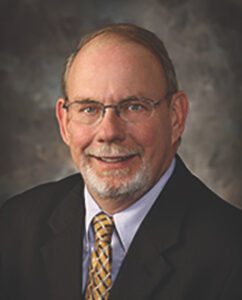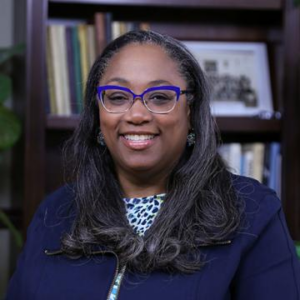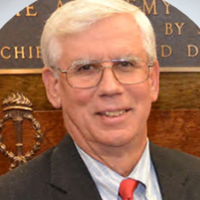 An expert on communications law and the First Amendment, Roy Gutterman is director of the Newhouse School’s Tully Center for Free Speech.
An expert on communications law and the First Amendment, Roy Gutterman is director of the Newhouse School’s Tully Center for Free Speech.
He is a graduate of the Newhouse School and the Syracuse University College of Law.
Gutterman worked as a reporter for the Cleveland Plain Dealer covering local and state government, crime, legal issues and general news. He later clerked for a New Jersey Superior Court judge and practiced business and general litigation. He also holds a courtesy appointment at the College of Law.
He writes and speaks on media law, free speech, the intersection between courts and journalists and legal education issues. He has delivered lectures at the Communication University of China in Beijing, Fudan University in Shanghai, National Chengchi University in Taipei and Lomonosov Moscow State University in Russia.
Gutterman was head of the AEJMC Law and Policy division from 2019-20, and is program director for the Burton Foundation for Legal Achievement. He sits on the Freedom of Information Committee for the Society of Professional Journalists and the faculty committee for the Government Accountability Project in Washington, D.C.
At Newhouse, Gutterman was the 2009-10 director of the Carnegie Legal Reporting Program. He also works with the Society of Professional Journalists student chapter and serves on academic integrity committees.
As an undergraduate, he worked at The Boston Globe; The Courier-News in Bridgewater, N.J. The Post-Standard in Syracuse; and The Daily Orange. While in law school, he served as editor-in-chief of the law review.
His book, “L.Rev: the Law Review Experience in American Legal Education” (Academica Press 2002), is in law school libraries around the world.

 Sam Fisher recently retired as president/CEO of the Illinois Press Association/Foundation. He is a graduate of the University of Missouri School of Journalism. Prior to joining the IPA Fisher spent 34 years with Shaw Media with over 25 years as a publisher of daily and weekly newspapers in northern Illinois.
Sam Fisher recently retired as president/CEO of the Illinois Press Association/Foundation. He is a graduate of the University of Missouri School of Journalism. Prior to joining the IPA Fisher spent 34 years with Shaw Media with over 25 years as a publisher of daily and weekly newspapers in northern Illinois. Karen Florin takes great pleasure in serving as a cheerleader for her co-workers and engaging with members of the community while working on the company’s digital strategy and long-term sustainability. She writes a weekly news column, organizes events, hosts a podcast called “The Storyline,” and raises funds for special projects.
Karen Florin takes great pleasure in serving as a cheerleader for her co-workers and engaging with members of the community while working on the company’s digital strategy and long-term sustainability. She writes a weekly news column, organizes events, hosts a podcast called “The Storyline,” and raises funds for special projects. Chris Crockett is the publisher at MaineStay Media, a newspaper group on the coast of Maine that includes The Ellsworth American, Mount Desert Islander, Courier-Gazette, Republican Journal, Camden Herald, and the Free Press. Chris has worked in newspapers for over 25 years, launching the newspaper’s digital initiatives and leading the advertising and sales teams before stepping into the role of publisher in 2020.
Chris Crockett is the publisher at MaineStay Media, a newspaper group on the coast of Maine that includes The Ellsworth American, Mount Desert Islander, Courier-Gazette, Republican Journal, Camden Herald, and the Free Press. Chris has worked in newspapers for over 25 years, launching the newspaper’s digital initiatives and leading the advertising and sales teams before stepping into the role of publisher in 2020. Brendan McQuaid is the current President of the New Hampshire Press Association. His day job is serving as President and Publisher of the New Hampshire Union Leader, the only statewide newspaper. A third-generation newspaperman, McQuaid was born and raised in the Granite State. He lives in Manchester with his wife and two basset hounds.
Brendan McQuaid is the current President of the New Hampshire Press Association. His day job is serving as President and Publisher of the New Hampshire Union Leader, the only statewide newspaper. A third-generation newspaperman, McQuaid was born and raised in the Granite State. He lives in Manchester with his wife and two basset hounds.
 Robert J. Ambrogi is a lawyer who practices media and technology law and serves as executive director of the Massachusetts Newspaper Publishers Association. Earlier in his career, he was editor-in-chief of the National Law Journal, the nation’s largest legal newspaper, and editorial director of American Lawyer Media’s Litigation Services Division. Before joining ALM, Bob was founding editor of the national newspaper Lawyers Weekly USA and editor-in-chief of Massachusetts Lawyers Weekly.
Robert J. Ambrogi is a lawyer who practices media and technology law and serves as executive director of the Massachusetts Newspaper Publishers Association. Earlier in his career, he was editor-in-chief of the National Law Journal, the nation’s largest legal newspaper, and editorial director of American Lawyer Media’s Litigation Services Division. Before joining ALM, Bob was founding editor of the national newspaper Lawyers Weekly USA and editor-in-chief of Massachusetts Lawyers Weekly.
 Link McKie has been a longtime newspaperman who in recent years added consulting and teaching to his career. His career began in 1970 as a regional reporter for the Telegram & Gazette of Worcester, Mass. In 20 years there, he was also a general assignment reporter; city government reporter and columnist; copy editor; assignment editor; assistant city editor; city editor and managing editor for the Worcester Telegram, and managing editor/news for the combined Telegram & Gazette. He later became executive editor of The Sun of Lowell, Mass., and publisher of Journal Transcript Newspapers’ five community newspapers based in Revere, Mass. During the past 28 years, he founded and ran Lincoln Associates, a communication consulting company. His company was publication manager for the New England Newspaper and Press Association Bulletin. McKie has taught journalism at Northeastern University, Boston University, and Emerson College. He has received reporting awards, and newspapers he managed won awards for excellence. McKie received the Yankee Quill Award in 2016 and is a member of the New England Newspaper Hall of Fame.
Link McKie has been a longtime newspaperman who in recent years added consulting and teaching to his career. His career began in 1970 as a regional reporter for the Telegram & Gazette of Worcester, Mass. In 20 years there, he was also a general assignment reporter; city government reporter and columnist; copy editor; assignment editor; assistant city editor; city editor and managing editor for the Worcester Telegram, and managing editor/news for the combined Telegram & Gazette. He later became executive editor of The Sun of Lowell, Mass., and publisher of Journal Transcript Newspapers’ five community newspapers based in Revere, Mass. During the past 28 years, he founded and ran Lincoln Associates, a communication consulting company. His company was publication manager for the New England Newspaper and Press Association Bulletin. McKie has taught journalism at Northeastern University, Boston University, and Emerson College. He has received reporting awards, and newspapers he managed won awards for excellence. McKie received the Yankee Quill Award in 2016 and is a member of the New England Newspaper Hall of Fame.
 Jim Rotche
Jim Rotche